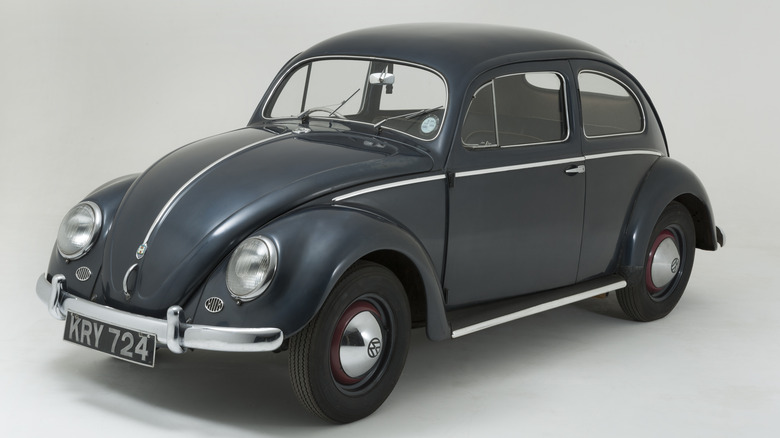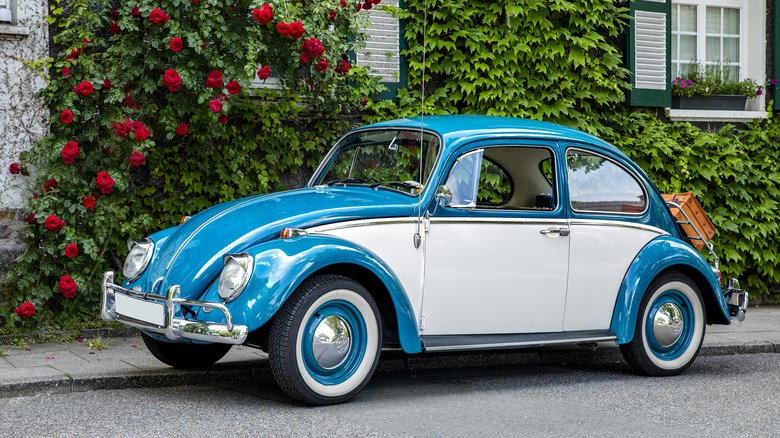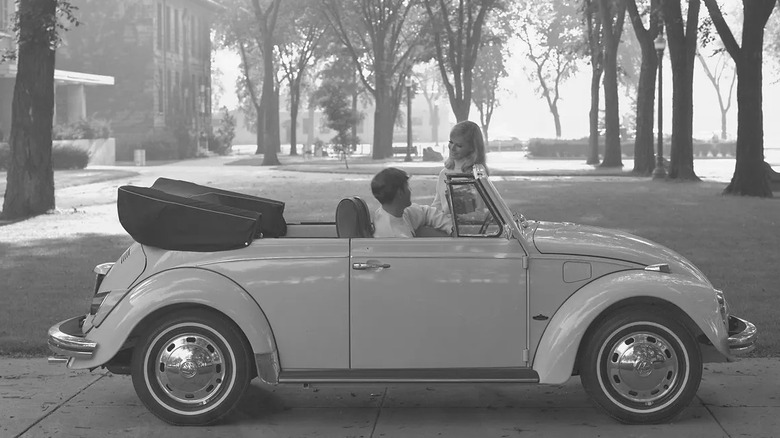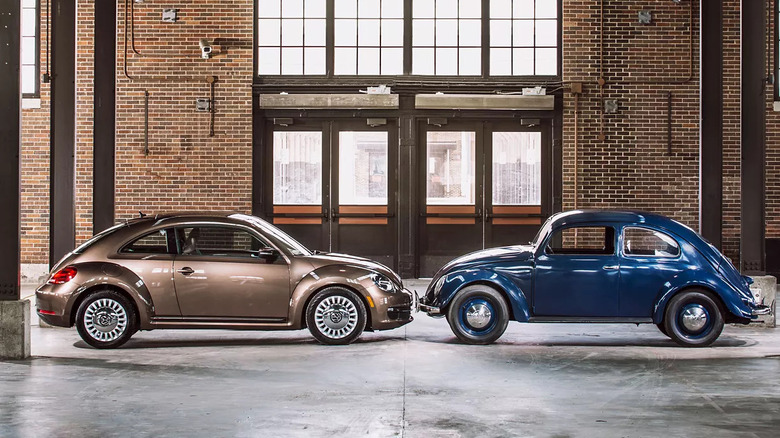The Reason Why The VW Beetle Was Banned In The US
When you think of how prolific Volkswagen's Beetle was globally, and how much of an impact it had on American car culture, it's hard to remember that the "Pregnant roller skate" was banned in the United States. Adolph Hitler's "People's Car" first came to America in 1949, and by the time it was banned in 1977, VW had sold 21,529,464 units, more than any other car in history.
Part of Hitler's grand plan to bring Germany together and show the world what an affluent country they were becoming post-WWI was to build a network of expressways that stretched over 3,700 miles. He called them "the pyramids of the Reich" and wanted these autobahns to be filled with small, affordable cars built for the masses (via Hagerty). With Ferdinand Porsche as lead designer, the new Volkswagen factory opened on May 26, 1938.
Interestingly, a New York Times report about the opening is considered to be where the first use of the word "beetle" occurred when they said "thousands of thousands of shiny little beetles" would soon be scurrying about Germany's autobahns (via Hagerty).
The little Beetle truly became the people's car
According to Hagerty, Henry Ford — who Hitler had admired greatly — didn't think the Beetle was "worth a damn," and the British automaker William Rootes thought it was "too ugly and noisy" and not worth the money. But despite the Hitler and Nazi stigma, the little bug with the rear-mounted, air-cooled engine became astonishingly popular everywhere it was sold.
The Manhattan ad agency Doyle Dane Bernbach was hired in 1959 to market the brand in the United States. Its now legendary, self-deprecating "Think Small" campaign helped bring the Beetle to the American masses. In 1963, Sports Illustrated called it "the most easily recognized car on earth" (via Hagerty). According to Bloomberg, between 1968 and 1973, Volkswagen sold more than one million Beetles every year. In 1972 it shot passed 15 million units sold globally, overtaking Ford's Model T as the number one selling car in the world. In 1968, Disney released "The Love Bug," the same year it became the world's best-selling car (via Hagerty).
Yet, the Beetle's popularity couldn't stave off a combination of a global recession, the 1973 oil crisis, or the decline of the dollar in 1978. Sales slumped throughout the 1970s, though in the end it wasn't demand which sealed the affordable VW's fate.
Volkswagen's cheap car was too expensive to update
In fact, it was legislation that marked the end of Beetle sales in the US. In 1977, with around five million or so of the cars sold in America, stricter emissions standards helped seal the Volkswagen's fate.
The 1977 Clean Air Act brought in tougher requirements for just how polluting gas vehicles could be, starting decades of tightening regulation aiming to cut the amount of dangerous chemicals carbon monoxide and nitrogen oxide released on the roads. That forced automakers to develop greener engines, a prospect which — with the Beetle already facing tougher Japanese rivals and a weaker American dollar — Volkswagen couldn't make the math add up on. Combined with more stringent safety requirements, with the arrival of the first frontal impact testing in 1978, and the Beetle just didn't make sense any more.
It had already been sharing dealership space with its replacement, the Volkswagen Rabbit, effectively the VW Golf Mk1 rebadged for the US market. From 1978, production of the Rabbit moved to North America, making it cheaper to manufacture in the process.
Everything old is new again
Ironically, when it came time to reboot the Beetle nameplate, it was the Golf — by then in its fourth generation — that donated the platform. The New Beetle launched in 1997, modernizing the cutesy bug styling and adding creature-comforts drivers of the original could only dream of. Larger than its namesake, it also skipped some of the features that had made the original Beetle so distinct. The engine was at the front, meaning the trunk could finally be used to carry your luggage.
Although initially only intended as a concept, strong public demand nudged Volkswagen into full production. By the 2003 model year a Beetle Convertible version had sliced off the roof, and numerous special editions helped coax out sales until a refresh in 2011. That brought sharper styling, as VW shifted away from the cutesy aesthetic, but time finally ran out for the distinctive car in 2019 when — with annual sales of just 17,215 cars in the US – the last Beetle rolled off the line in July.



